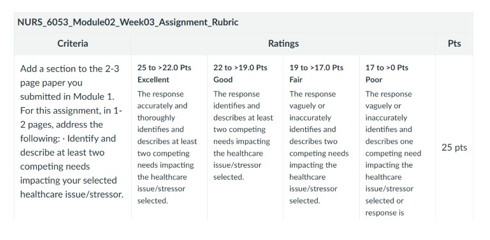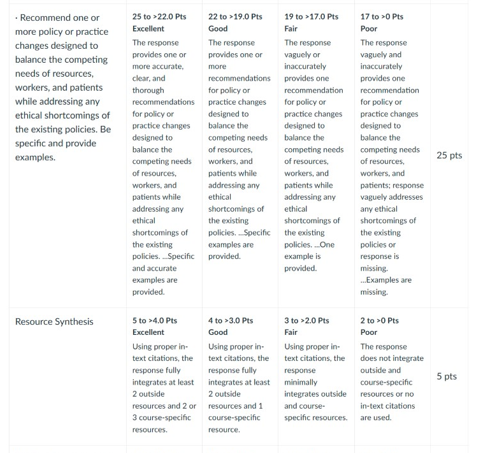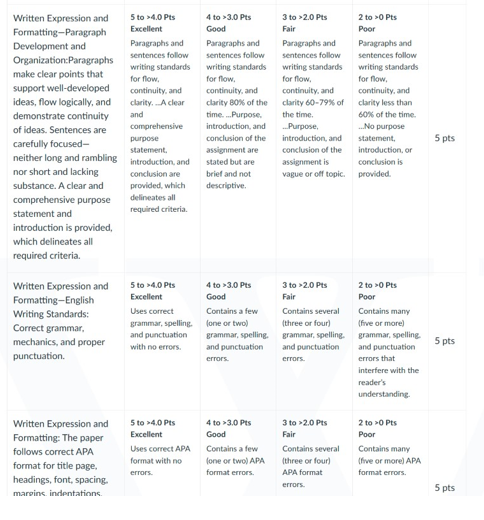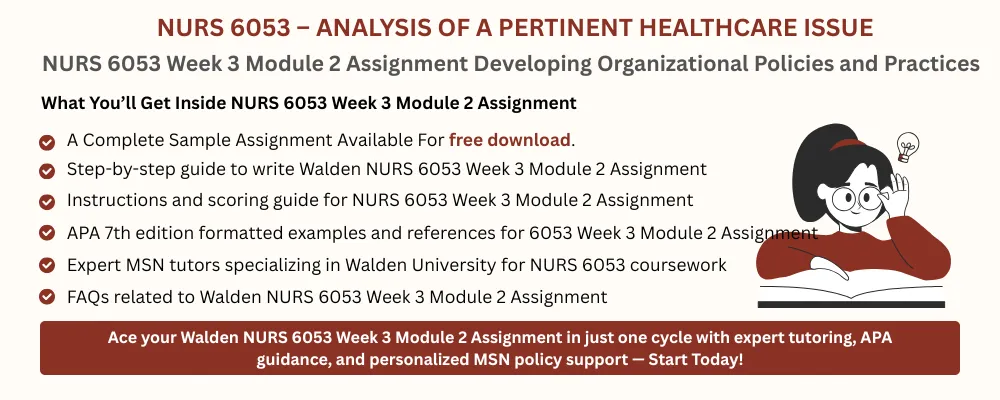NURS 6053 Week 3 Module 2 Assignment FREE DOWNLOAD
NURS 6053 Week 3 Module 2 Assignment
Developing Organizational Policies and Practices
Student Name
Walden University
NURS 6053
Professor Name
Date
Developing Organizational Policies and Practices
In healthcare organizations, nurse burnout is a common problem that occurs because of excessive workloads, shortage of staff, and psychological effects of attending to severely ill patients. Burnout exacerbates the care provided to patients, errors, and the turnover. The given assignment explores conflicting needs that result in nurse burnout and an applicable organizational policy. The given assignment suggests a set of resource allocation changes that enhance both the well-being of nurses and patient care through the critical analysis of the ethical implication of this policy and applying evidence-based methods.
Competing Needs
Nurse burnout depends on staffing and working conditions. Workload of nurses is influenced by the number of staff (Griffiths et al., 2020). The causes of burnout include the overworking of employees, the long working hours, and stress levels due to a lack of sufficient staff. In situations where the number of nurses is reduced, each will be required to attend more patients leading to physical and mental stress. The work environment determines nurse burnout. Positive work environment can result in increased job satisfaction and reduced stress through promotion of communication, appreciation and collaboration. On the other hand, a working environment that is hostile with bad management, support, and resources augments burnout. As an illustration, workplace culture that does not support employees and ineffective communication may cause them to experience alienation and underappreciation, increasing the risk of burnout. By balancing such demands, nurse burnout should be considered.
Policy
Mandatory overtime policy in our organization has significant influence on nurse burnout. This policy requires nurses to work overtime in order to meet patient care and staffing needs. This method does not allow staffing gaps to undermine patient care, yet it puts an extra burden on nurses and leads to burnout. Mandatory overtime can cause nurses to become chronically tired, dissatisfied with their work, and in poor health (Caruso et al., 2022). Work-life balance is affected negatively and it is difficult to balance between family and personal life. Although this policy is aimed at maintaining the quality of patient care, it overloads the staff and leads to burnout in nurses.
Critique for Ethical Considerations
The required overtime regulation is ethically questionable. Unhealthy situations should not be allowed to work as a nurse. The policy can be a violation of autonomy because it limits the work-life balance of nurses. The strength of the policy is on the rapid response to staffing shortages that would guarantee the quality of patient care. It puts more emphasis on patient care than on nurse welfare; however, its implementation can be unethical.
One of the largest obstacles is the nonmaleficence principle that entails the healthcare organizations avoiding harm (Cheraghi et al., 2023). The organization can also induce fatigue and stress to the nurses by making them work overtime. Another issue is the problem of justice, where fairness is necessary. The policy may have the staff feeling like they are unfairly loaded with overtime requirements.
Recommendation for Policy
The ethical concerns of the overtime policy required can be overcome by the flexibility of scheduling and the resources of nurse support to balance the needs of resources, workers, and patients. Flexible scheduling would allow nurses to choose flexible schedules that will fit their personal and professional life, reducing burnout. In one instance, job sharing or part-time work can help the nurses to cope with workload without interfering with patient care. Improving mental health services and support can be helpful as well to help nurses cope with occupational stress (Scanlan and Still, 2019). Nurses can be assisted to overcome stress and develop resilience by regularly visiting mental health specialists and peer support groups. As an example, psychotherapy or mindfulness training may help a stressed nurse to feel better and enjoy his or her work.
Scholarly Resources
The article The effects of stress-coping strategies and group cognitive-behavioral therapy on nurse burnout describes the ways of preventing nurse burnout using CBT (Bagheri et al., 2019). This research would help me to recommend the enhancement of nurse support resources by proposing that stress management techniques and group CBT can help nurses to enhance resilience during stress management. Another relevant article is named Nurse Faculty Burnout and Strategies to Avoid it. This article emphasizes the idea of work-life balance and workplace support to avoid burnout (Thomas et al., 2019). Flexible work and career development are mentioned, which adds to my demand to have increased support resources. These intervention strategies can enhance nurse burnout and work conditions.
Conclusion
Nurse burnout necessitates resources, workers and patient balance. Flexible scheduling and support resources help to avoid burnout by critically analyzing the overtime policy and pinpointing its ethical flaws. These are scientifically-based suggestions that enhance the working conditions of nurses. Nurse well-being can be improved by policy changes, resulting in a reduction of burnout, turnover, and the maintenance of a sustainable and efficient healthcare system.
Struggling with your NURS 6053 Week 2 Assignment? Get a complete guide and ace your paper today!
Instructions To Write NURS 6053 Week 3 Module 2 Assignment
Need instructions for this assessment? Contact us now and get expert guidance right away!
Instructions File For 6053 Week 3 Module 2 Assignment
DEVELOPING ORGANIZATIONAL POLICIES AND PRACTICES
Competing needs arise within any organization as employees seek to meet their targets and leaders seek to meet company goals. As a leader, successful management of these goals requires establishing priorities and allocating resources accordingly.
Within a healthcare setting, the needs of the workforce, resources, and patients are often in conflict. Mandatory overtime, implementation of staffing ratios, use of unlicensed assisting personnel, and employer reductions of education benefits are examples of practices that might lead to conflicting needs in practice.
Leaders can contribute to both the problem and the solution through policies, action, and inaction. In this Assignment, you will further develop the white paper you began work on in Module 1 by addressing competing needs within your organization.
RESOURCES
Be sure to review the Learning Resources before completing this activity. Click the weekly resources link to access the resources.
WEEKLY RESOURCES
To Prepare:
Review the national healthcare issue/stressor you examined in your Assignment for Module 1, and review the analysis of the healthcare issue/stressor you selected.
Identify and review two evidence-based scholarly resources that focus on proposed policies/practices to apply to your selected healthcare issue/stressor.
Reflect on the feedback you received from your colleagues on your Discussion post regarding competing needs.
The Assignment (1-2 pages)
Developing Organizational Policies and Practices
Add a section to the 2-3 page paper you submitted in Module 1. The new section should address the following in 1-2 pages:
Identify and describe at least two competing needs impacting your selected healthcare issue/stressor.
Describe a relevant policy or practice in your organization that may influence your selected healthcare issue/stressor.
Critique the policy for ethical considerations, and explain the policy’s strengths and challenges in promoting ethics.
Recommend one or more policy or practice changes designed to balance the competing needs of resources, workers, and patients, while addressing any ethical shortcomings of the existing policies. Be specific and provide examples.
Cite evidence that informs the healthcare issue/stressor and/or the policies, and provide two scholarly resources in support of your policy or practice recommendations.
Due to the nature of this assignment, your instructor may require more than 7 days to provide you with quality feedback.
BY DAY 7 OF WEEK 3
Submit your revised paper.
SUBMISSION INFORMATION
Before submitting your final assignment, you can check your draft for authenticity. To check your draft, access the Turnitin Drafts from the Start Here area.
To submit your completed assignment, save your Assignment as WK2Assign_LastName_Firstinitial
Then, click on Start Assignment near the end of the page.
Next, click on Upload File and select Submit Assignment for review.
6053 Week 3 Module 2 Assignment Rubrics





References For NURS 6053 Week 3 Module 2 Assignment
Bagheri, T., Fatemi, M. J., Payandan, H., Skandari, A., & Momeni, M. (2019). The effects of stress-coping strategies and group cognitive-behavioral therapy on nurse burnout. Annals of Burns and Fire Disasters, 32(3), 184–189. https://www.ncbi.nlm.nih.gov/pmc/articles/PMC7155410/
Caruso, C. C., Arbour, M. W., Berger, A. M., Hittle, B. M., Tucker, S., Patrician, P. A., Trinkoff, A. M., Rogers, A. E., Barger, L. K., Edmonson, J. C., Landrigan, C. P., Redeker, N. S., & Chasens, E. R. (2022). Research priorities to reduce risks from work hours and fatigue in the healthcare and social assistance sector. American Journal of Industrial Medicine. https://doi.org/10.1002/ajim.23363
Cheraghi, R., Valizadeh, L., Zamanzadeh, V., Hassankhani, H., & Jafarzadeh, A. (2023). Clarification of ethical principle of the beneficence in nursing care: an Integrative Review. BMC Nursing, 22(1), 1–9. https://doi.org/10.1186/s12912-023-01246-4
Griffiths, P., Saville, C., Ball, J., Jones, J., Pattison, N., & Monks, T. (2020). Nursing workload, nurse staffing methodologies & tools: a systematic scoping review & discussion. International Journal of Nursing Studies, 103(1), 103487. https://doi.org/10.1016/j.ijnurstu.2019.103487
Scanlan, J. N., & Still, M. (2019). Relationships between burnout, turnover intention, job satisfaction, job demands and job resources for mental health personnel in an Australian mental health service. BMC Health Services Research, 19(1). https://doi.org/10.1186/s12913-018-3841-z
Thomas, C. M., Bantz, D. L., & McIntosh, C. E. (2019). Nurse faculty burnout and strategies to avoid it. Teaching and Learning in Nursing, 14(2), 111–116. https://doi.org/10.1016/j.teln.2018.12.005
Best Professors To Choose From For NURS 6053 Class
- Paula Stechschulte, PhD, MS, BSN
- Lynn Parsons
- Michael Grossman
- Elvira G. Phelps
- Phyllis Lawrence, DNP
(FAQs) related to NURS 6053 Week 3 Module 2 Assignment
Question 1: Where can I download a free sample forNURS 6053 Week 3 Module 2 Assignment?
Answer 1: Download a free sample from Tutors Academy.
Question 2: Where can I find the rubrics and instruction file for NURS 6053 Week 3 Module 2 Assignment?
Answer 2: Get the rubric and instruction file from the Tutors Academy website.
Do you need a tutor to help with this paper for you with in 24 hours.
- 0% Plagiarised
- 0% AI
- Distinguish grades guarantee
- 24 hour delivery

